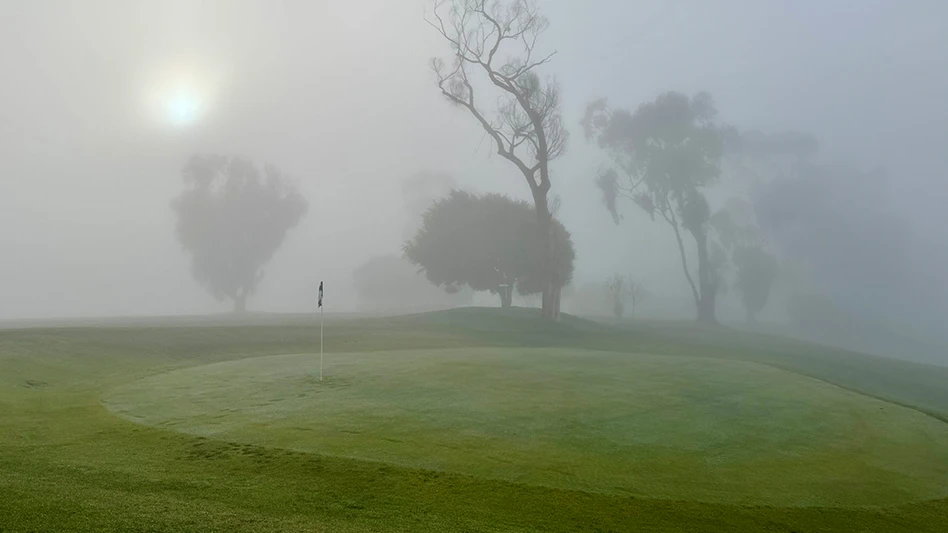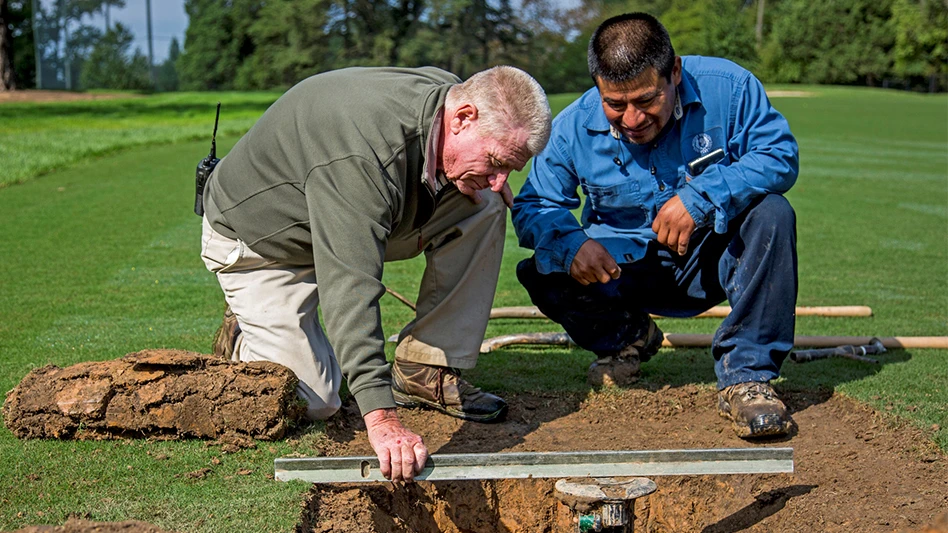
After months of speculation, the USGA officially announced Friday the early retirement of dozens of employees, including 11 members of the Green Section who are older than 55, which will merge later this year with the association’s Research, Science and Innovation Group.
Golf Course Industry editor-at-large Pat Jones talked with Rand Jerris, the USGA’s senior managing director of public services, about the circumstances leading to the early retirement offers for those staff members and the future of the Green Section.
Pat Jones: Tell us why the Green Section is still valuable.
Rand Jerris: It would be difficult to overstate the value that the USGA Green Section brings to the game, and especially to the golf courses where we all play and to the communities that surround them. The members of our team are thought leaders in sustainability, champions of public golf, and leading experts in agronomic and environmental science. As an organization, we take great pride in all they do to keep golf courses healthy and to keep golfers happy. The Green Section has delivered this value for nearly 100 years and we will ensure this legacy by continuing to commit to research, educational programs, consulting services and solutions that advance the game.
PJ: What brought about the decision to offer early retirements to multiple members of the Green Section staff?
RJ: To be clear, this was not singularly a Green Section offering. Earlier this year, the USGA presented a strictly voluntary retirement incentive to more than 60 employees across the organization who were part of a pension plan that was offered to employees who joined the USGA prior to 2008. We made a decision to freeze the pension plan based on participation numbers, and we opted to provide each person in the plan who was over the age of 55 a one-time option to receive additional years of eligibility and other benefits — such as continued healthcare — if they chose to retire early. Among those eligible, 49 accepted the offer, 11 of whom worked for the USGA Green Section. To lose 11 Green Section experts in our ranks is hard for many of us both professionally and personally. They are our coworkers and our friends.
PJ: How does this reflect the continuing evolution of the Green Section?
RJ: Over recent years, Dr. Kimberly Erusha and the members of her team worked hard to evolve the Green Section to be even more relevant to the clubs, courses and golf course professionals that they serve directly. This has involved looking thoughtfully and deeply at the department’s core programs, and asking hard questions about the educational value of our programs, as well as the reach of these same programs. To their credit, the team saw opportunities to improve and expand both.
Embracing a mindset of continuous improvement, they’ve worked to implement some substantive changes that were designed to extend our reach beyond the comparatively small number of high-end facilities that were traditionally our core audience. There are more than 15,000 golf facilities in the United States, and more than 30,000 globally, and we wanted to evolve our programs in ways that would allow our expertise eventually to reach all of them. For some of our agronomists, this has meant spending less time engaging in one-on-one consulting relationships with individual clubs and more time creating educational content and delivering educational programs that large audiences can use and easily adopt.
It’s also meant spending more time engaging with and listening to golf course superintendents, golf course owners and even golfers themselves, to understand better their pressures, challenges and ongoing needs. Listening to and engaging with our customers has led us to create new offerings through the Course Consulting Service, develop new educational materials and programs, and identify new needs for critical research over the past several years. Through all of this work, the team has become more nimble, more responsive and, we believe, more impactful.
With the recent changes to the team, we’ll continue to leverage this same mindset of continuous improvement — constantly assessing the evolving needs of the golf community and ensuring that we have the best team and the best programs to support them.
PJ: What will the Green Section look like 10 or 15 years from now?
RJ: We understand that a thriving game requires expertise, resources and solutions and we believe that the USGA’s 100-year history in leading the game forward in these areas must continue.
As we look to the future, we remain committed to supporting four core activities of the Green Section: 1) investing in agronomic and environmental research to improve the quality of the golf experience and foster the sustainability of golf courses, 2) offering consulting services that provide expertise and guidance quickly both when and how our customers need support, 3) developing meaningful education programs and materials that advance the implementation of best practices at golf facilities around the world, and 4) developing cutting edge tools, technologies and solutions that are needed by our customers. The team that delivers these programs could include scientists, engineers, urban planners, water experts and more — the problems we need to solve are complex and we’ll need a diverse set of skills and experiences on our team to deliver against our core promises.
One thing that we are sure of is this: the Green Section of the future will continue to include the best minds in both the science and operation of the golf course, professionals who are committed to helping facilities deliver great experiences to golfers, supporting golf course operators in being strong stewards of important natural resources and assuring the golf courses deliver great value to their surrounding communities.
Get curated news on YOUR industry.
Enter your email to receive our newsletters.Latest from Golf Course Industry
- Beyond the Page 65: New faces on the back page
- From the publisher’s pen: New? No way!
- Indiana course upgrades range with synthetic ‘bunkers’
- Monterey Peninsula CC Shore Course renovation almost finished
- KemperSports and Touchstone Golf announce partnership
- PBI-Gordon Company hires marketing manager Jared Hoyle
- Mountain Sky Guest Ranch announces bunker enhancement project
- GCSAA names Joshua Tapp director of environmental programs






